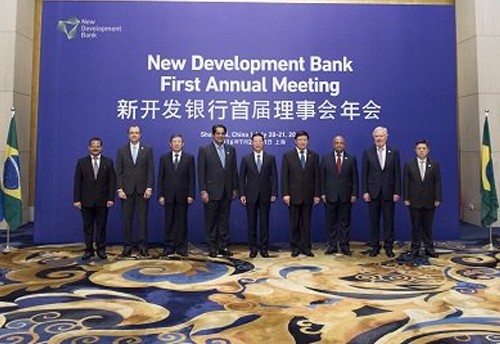1st Annual Meeting of BRICS’ New Development Bank – IIB contributes to the implementation of NDB’s first project in Russia

The BRICS countries’ New Development Bank (NDB), with assistance from the International Investment Bank (IIB) and the Eurasian Development Bank (EDB), will launch its first project in the Russian Federation – construction of two hydropower plants in Russia’s republic of Karelia with a combined capacity of 49.8 MW. NDB’s Board of Directors (BoD) approved the corresponding financing of USD 100 million on July 20, 2016 during the events of the 1st Annual Meeting (AM) of NDB’s governing bodies in Shanghai, China.
The AM took place with the participation of the Chairman of IIB’s Board, Nikolay Kosov, who held a bilateral meeting with the NDB President, K.V. Kamath. The parties discussed arrangements for NDB’s first project in Russia and opportunities for further expansion of cooperation, including in relation to project finance and syndicated lending. The chief executives of the two multilateral development banks (MDBs) also agreed on joint consultations regarding issues such as relations with international rating agencies and bond issuance in their member countries, and outlined a number of specific steps in these areas and others.
Under the implementation of the project in Karelia, the NDB will provide the IIB with targeted financing of USD 50 million, based on which the IIB will open a credit line for JSC “Nord Hydro” in Russian roubles. The maturity of the loan is 12 years with the IIB covering associated project risks and assisting the BRICS bank in developing its operations in the Russian Federation.
“The construction of hydropower facilities in Karelia is a practical result of our partnership with the NDB, representing implementation of a large-scale project in the real sector of the economy of our major shareholder, Russia,” – N. Kosov commented on the decision of NDB’s BoD. “Support of Karelia’s energy complex with renewable energy sources is in tune with IIB’s environmental policy, which pays great attention to sustainable development in its member countries.”
The funding under the first NDB project in Russia has several unique features for the IIB. It involves the first credit line for the IIB from another multilateral development institution, and will become its most long-term funding up to date.
N. Kosov did not rule out that the multilateral development institution would use its RUB 100 billion bond programme registered at the Moscow Exchange to attract funding in Russian roubles for the project.
During the AM events, the IIB Chairman also participated in the roundtable on MDBs’ practices. He presented recommendations for NDB’s future development, based on the experience of IIB’s relaunch and its large-scale reform since 2012. An interesting discussion took place regarding the role, specialization and possible niches for MDBs in the emerging global economic and financial circumstances. Several topics were emphasized, such as differences from commercial banks and relations with rating agencies, taking into account toughening criteria of the Basel Committee.
Early in 2016, the IIB and the NDB established dynamic working contacts after a series of meetings between their high-level representatives, during which they considered opportunities for bolstering joint activities, including project financing and expansion on capital markets. The Russian Federation is a major shareholder in both institutions, and the banks share an interregional character of shareholders, being open to cooperation with other MDBs and countries.
Reference
New Development Bank (NDB) – the NDB was created with a vision to support and foster infrastructure and sustainable development initiatives in emerging economies. It will complement the efforts of other existing financial institutions to realize the common goal of global growth. The founding members of the NDB – Brazil, Russia, India, China and South Africa (BRICS) – have paid in capital of USD 1.5 billion thus far as capital contributions. With the signing of the Headquarters Agreement with the Government of the People's Republic of China and Memorandum of Understanding with Shanghai Municipal People's Government in February 2016, the Bank became fully operational.


